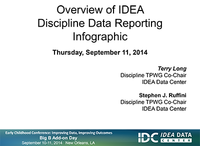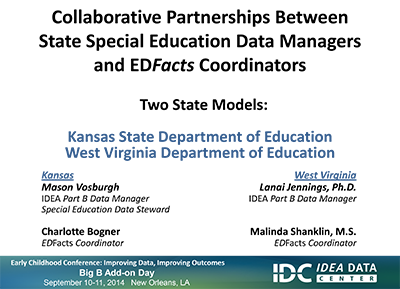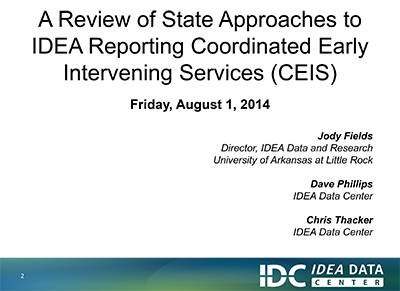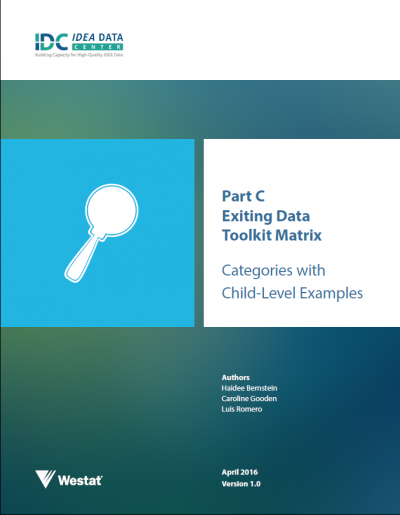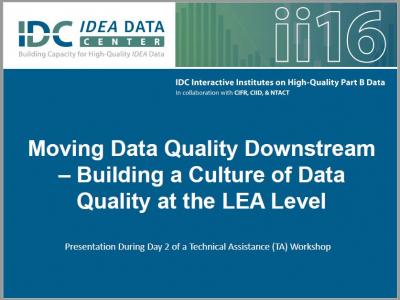Site Search
Results 1 - 7 of 21
Format: Presentations
Overview of IDEA Discipline Data Reporting InfographicThe presentation reviewed a new TA tool that summarizes the basics of reporting IDEA discipline data in the six EDFacts file formats. Presenters described and demonstrated the new IDC infographic, discussed how SEAs and LEAs can use it to improve the quality of their discipline data, and requested audience input.
Format: Presentations
National, State and Local Inclusion Data: Accessing and Using Data to Increase Inclusive OpportunitiesThe presentation focused on current national data on inclusive settings for children, ages three to five. Presenters drilled down to state examples of how state share data with local programs and how locals use that data for program improvement. Presenters discussed potential improvement strategies based on data available to state and local programs. Presentation objectives were to: provide an overview of inclusion and Educational Environments 618 and Indicator 6 data, share state and local reporting, and discuss use of data to improve inclusion.
Format: Presentations
Collaborative Partnerships Between State Special Education Data Managers and EDFacts Coordinators: Two Models-Working Together to Make a DifferenceThe presentation outlined the collaborative partnerships between the Part B data manager and EDFacts coordinator in two states--West Virginia and Kansas. The discussion included a range of topics from collaborating on data collection and verification at the LEA level to SEA EDFacts submissions. The presentation included time for other Part B data managers to share strategies for successful submission of their 618 data through EDFacts.
Format: Presentations
A Review of State Approaches to IDEA Reporting Coordinated Early Intervening Service (CEIS)IDEA allows, and sometimes requires, LEAs to use funds provided under Part B of IDEA for CEIS for students who are not receiving special education services. There are multiple data collection and reporting requirements associated with the use of these funds for CEIS. IDC staff review how a diverse subset of states and their LEAs are working to meet those requirements. Both aggregate and student-level reporting approaches are reviewed.
Format: Presentations
Public Reporting of Section 618 Data: Regulations, Processes, and PitfallsIDEA requires that states publicly report Section 618 data. To assist SEA special education directors and data managers in meeting these requirements, IDC is developing a TA tool to simplify regulatory language and requirements into one document that includes process tips and pitfalls. The presentation highlighted existing practice across the country and provided opportunity for attendees to review the current draft of the proposed TA tool.
Format: Checklists, Crosswalks, and Rubrics
Part C Exiting Data Matrix: Categories with Child-Level ExamplesThis matrix is both a standalone product and the fourth section of the IDEA Data Center Part C Exiting Data Toolkit. It contains scenarios for each of the 10 exiting categories. The Part C Exiting Data Toolkit is designed to assist states in reporting high-quality Part C exiting data, required under Section 618 of IDEA. The remaining three sections in the Part C Exiting Data Toolkit are: Part C Exiting Reasons and Categories (Section 1); General Challenges and Potential Solutions (Section 2, Part 1); Specific Challenges, Potential Solutions, and Variation (Section 2, Part 2); and Data Check Patterns and Additional Data Check Patterns to Ensure Non-Duplicated Counts of All Eligible Exiting Children (Section 3).
Format: Presentations
Moving Data Quality Downstream - Building a Culture of Data Quality at the LEA LevelPresenters and participants discussed strategies that SEAs can use to help LEAs in collecting section 618 and other state-required data that is of high-quality. They explored IDC’s Knowledge Lab that lists various resources around different data collections. The Knowledge Lab contains many resources designed to help SEAs and LEAs gather, collect, validate, and report high-quality data. The discussion allowed for state input on how the state uses or can use these resources.


